00 Responsibility 09 The Charge of the Light Brigade(1)
- 格式:pdf
- 大小:177.13 KB
- 文档页数:2
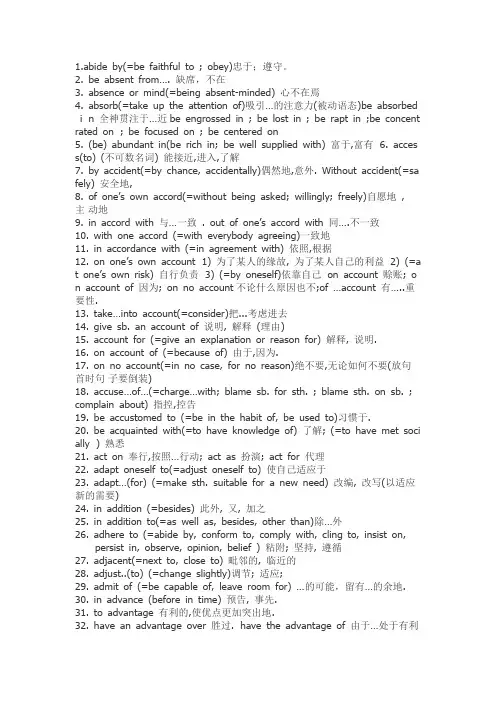
1.abide by(=be faithful to ; obey)忠于;遵守。
2. be absent from…. 缺席,不在3. absence or mind(=being absent-minded) 心不在焉4. absorb(=take up the attention of)吸引…的注意力(被动语态)be absorbedi n 全神贯注于…近be engrossed in ; be lost in ; be rapt in ;be concent rated on ; be focused on ; be centered on5. (be) abundant in(be rich in; be well supplied with) 富于,富有6. acces s(to) (不可数名词) 能接近,进入,了解7. by accident(=by chance, accidentally)偶然地,意外. Without accident(=sa fely) 安全地,8. of one’s own accord(=without being asked; willingly; freely)自愿地,主动地9. in accord with 与…一致. out of one’s accord with 同….不一致10. with one accord (=with everybody agreeing)一致地11. in accordance with (=in agreement with) 依照,根据12. on one’s own account 1) 为了某人的缘故, 为了某人自己的利益 2) (=a t one’s own risk) 自行负责 3) (=by oneself)依靠自己 on account 赊账; o n account of 因为; on no account不论什么原因也不;of …account 有…..重要性.13. take…into account(=consider)把...考虑进去14. give sb. an account of 说明, 解释(理由)15. account for (=give an explanation or reason for) 解释, 说明.16. on account of (=because of) 由于,因为.17. on no account(=in no case, for no reason)绝不要,无论如何不要(放句首时句子要倒装)18. accuse…of…(=charge…with; blame sb. for sth. ; blame sth. on sb. ; complain about) 指控,控告19. be accustomed to (=be in the habit of, be used to)习惯于.20. be acquainted with(=to have knowledge of) 了解; (=to have met soci ally ) 熟悉21. act on 奉行,按照…行动; act as 扮演; act for 代理22. adapt oneself to(=adjust oneself to) 使自己适应于23. adapt…(for) (=make sth. suitable for a new need) 改编, 改写(以适应新的需要)24. in addition (=besides) 此外, 又, 加之25. in addition to(=as well as, besides, other than)除…外26. adhere to (=abide by, conform to, comply with, cling to, insist on,persist in, observe, opinion, belief ) 粘附; 坚持, 遵循27. adjacent(=next to, close to) 毗邻的, 临近的28. adjust..(to) (=change slightly)调节; 适应;29. admit of (=be capable of, leave room for) …的可能,留有…的余地.30. in advance (before in time) 预告, 事先.31. to advantage 有利的,使优点更加突出地.32. have an advantage over 胜过. have the advantage of 由于…处于有利条件 have the advantage of sb.知道某人所不知道的事33. take advantage of (=make the best of, utilize, make use of, profit from, harness)利用.34. agree with 赞同(某人意见) agree to 同意35. in agreement (with) 同意, 一致36. ahead of 在…之前, 超过…;……………. ahead of t ime 提前.37. in the air 1)不肯定, 不具体. 2)在谣传中.38. above all (=especially, most important of all) 尤其是, 最重要的.39. in all (=counting everyone or everything, altogether) 总共, 总计40. after all 毕竟,到底; (not) at all 一点也不; all at once(=suddenly)突然; once and for all 只此一次; above all 最重要的; first of all 首先; all in all 大体上说; be all in 累极了; all but 几乎.41. allow for (=take into consideration, take into account) 考虑到, 估计到 .42. amount to (=to be equal to) 总计, 等于.43. answer for (undertake responsibility for, be liable for, take charge for)对…负责.44. answer to (=conform to) 适合,符合.45. be anxious about 为…焦急不安; 或anxious for46. apologize to sb. for sth. 为…向…道歉47. appeal to sb. for sth. 为某事向某人呼吁. appeal to sb. 对某人有吸引力48. apply to sb. for sth. 为…向…申请; apply for申请; apply to 适用.49. apply to 与…有关;适用50. approve of (=consent to, be in favor of, favor, agree to, consider go od, right) 赞成, approve vt. 批准51. arise from(=be caused by) 由…引起.52. arrange for sb.sth. to do sth. 安排…做…53. arrive on 到达; arrive at 到达某地(小地方);得出,作出; arrive in 到达某地(大地方);54. be ashamed of (=feel shame, guilt or sorrow because of sth. done) 以…为羞耻55. assure sb. of sth. (=try to cause to believe or trust in sth.) 向…保证,使…确信.56. attach(to) (=to fix, fasten; join) 缚, 系,结57. make an attempt at doing sth. (to do sth.) 试图做…58. attend to (=give one’s attention, care and thought)注意,照顾;attend o n(upon)(=wait upon, serve, look after) 侍候,照料59. attitude to toward …对…的态度.看法60. attribute…to…(=to believe sth. to be the result of…)把..归因于.., 认为..是..的结果61. on the average (=on average, on an average) 平均62. (be) aware of (=be conscious of , having knowledge or consciousnes s)意识到,知道.63. at the back of (=behind) 在…后面64. in the back of 在…后部(里面); on the back of 在…后部(外面); be on one’s back(=be ill in bed) 卧病不起.65. at one’s back(=supporting or favoring sb.) 支持,维护; have sb. at one ’s back 有…支持, 有…作后台66. turn one’s back on sb. (=turn away from sb. in an impolite way) 不理睬(某人),背弃,抛弃67. behind one’s back 背着某人(说坏话)68. be based on upon 基于69. on the basis of 根据…, 在…基础上70. beat…at 在…运动项目上打赢71. begin with 以…开始. to begin with (=first of all) 首先, 第一(经常用于开始语)72. on behalf of (=as the representative of) 以…名义73. believe in(=have faith or trust in; consider sth. / sb. to be true) 相信,依赖,信仰.74. benefit (from) 受益,得到好处.75. for the benefit of 为了…的利益(好处)76. for the better 好转77. get the better of (=defeat sb.) 打败, 胜过.78. by birth 在出生上,论出身,按血统at birth 在出生时; give birth to 出生79. blame sb. for sth. 因…责备某人 . blame sth. on sb. 把…推在某人身上80. in blossom开花(指树木) be in blossom开花(强调状态) come into bloss om开花(强调动作)81. on board 到船上, 在船上, 上火车或飞机82. boast of (or about) 吹嘘83. out of breath 喘不过气来84. in brief(=in as few words as possible)简言之85. in bulk 成批地,不散装的86. take the floor 起立发言87. on business 出差办事.88. be busy with sth.于某事。
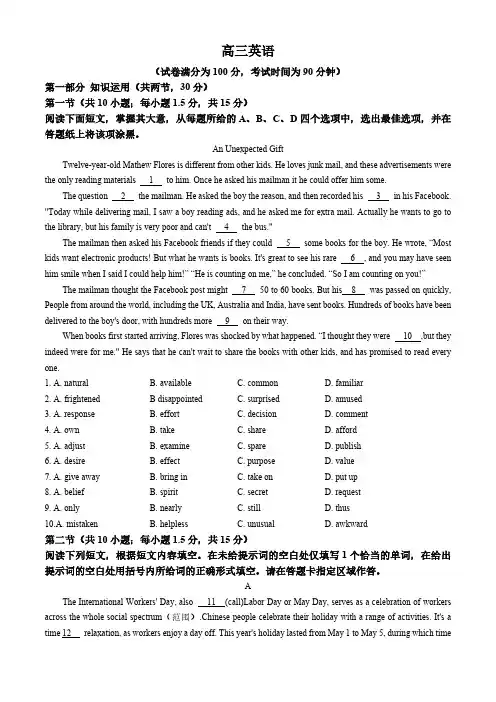
高三英语(试卷满分为100分,考试时间为90分钟)第一部分知识运用(共两节,30分)第一节(共10小题;每小题1.5分,共15分)阅读下面短文,掌握其大意,从每题所给的A、B、C、D四个选项中,选出最佳选项,并在答题纸上将该项涂黑。
An Unexpected GiftTwelve-year-old Mathew Flores is different from other kids. He loves junk mail, and these advertisements were the only reading materials 1 to him. Once he asked his mailman it he could offer him some.The question 2 the mailman. He asked the boy the reason, and then recorded his 3 in his Facebook. "Today while delivering mail, I saw a boy reading ads, and he asked me for extra mail. Actually he wants to go to the library, but his family is very poor and can't 4 the bus."The mailman then asked his Facebook friends if they could 5 some books for the boy. He wrote, “Most kids want electronic products! But what he wants is books. It's great to see his rare 6 , and you may have seen him smile when I said I could help him!” “He is counting on me,” he concluded. “So I am counting on you!”The mailman thought the Facebook post might 7 50 to 60 books. But his 8 was passed on quickly, People from around the world, including the UK, Australia and India, have sent books. Hundreds of books have been delivered to the boy's door, with hundreds more 9 on their way.When books first started arriving, Flores was shocked by what happened. “I thought they were 10 ,but they indeed were for me." He says that he can't wait to share the books with other kids, and has promised to read every one.1. A. natural B. available C. common D. familiar2. A. frightened B disappointed C. surprised D. amused3. A. response B. effort C. decision D. comment4. A. own B. take C. share D. afford5. A. adjust B. examine C. spare D. publish6. A. desire B. effect C. purpose D. value7. A. give away B. bring in C. take on D. put up8. A. belief B. spirit C. secret D. request9. A. only B. nearly C. still D. thus10.A. mistaken B. helpless C. unusual D. awkward第二节(共10小题;每小题1.5分,共15分)阅读下列短文,根据短文内容填空。
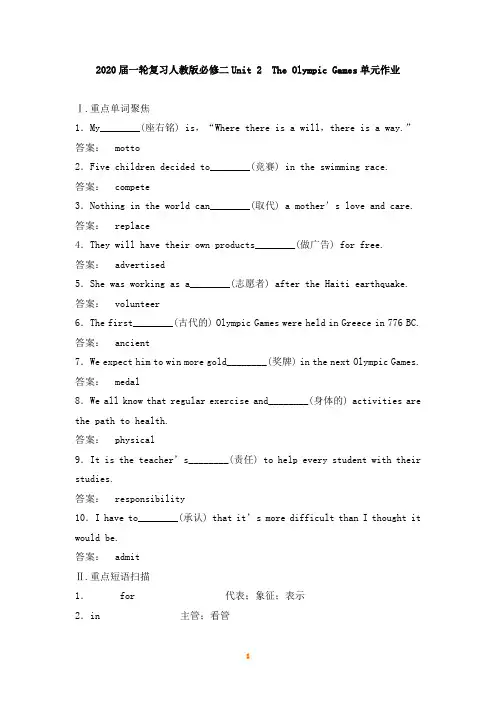
2020届一轮复习人教版必修二Unit 2 The Olympic Games单元作业Ⅰ.重点单词聚焦1.My________(座右铭) is,“Where there is a will,there is a way.”答案:motto2.Five children decided to________(竞赛) in the swimming race.答案:compete3.Nothing in the world can________(取代) a mother’s love and care. 答案:replace4.They will have their own products________(做广告) for free.答案:advertised5.She was working as a________(志愿者) after the Haiti earthquake. 答案:volunteer6.The first________(古代的) Olympic Games were held in Greece in 776 BC. 答案:ancient7.We expect him to win more gold________(奖牌) in the next Olympic Games. 答案:medal8.We all know that regular exercise and________(身体的) activities are the path to health.答案:physical9.It is the teacher’s________(责任) to help every student with their studies.答案:responsibility10.I have to________(承认) that it’s more difficult than I thought it would be.答案:admitⅡ.重点短语扫描1. for 代表;象征;表示2.in 主管;看管3. four years 每四年5.pick 捡起6.as a of fact 事实上7. part in 参加;参与8.as 也;又;还standchargeeveryupmattertakewell9.one after 陆续的;一个接一个地anotherⅢ.课文原句突破1.只有达到他们各自项目统一标准的运动员才会被接受参加奥运会。

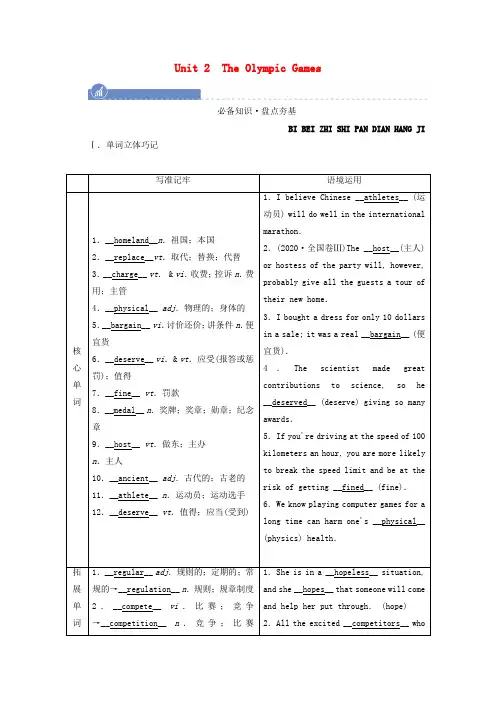
Unit 2The Olympic Games必备知识·盘点夯基BI BEI ZHI SHI PAN DIAN HANG JI Ⅰ.单词立体巧记写准记牢语境运用核心单词1.__homeland__n.祖国;本国2.__replace__vt.取代;替换;代替3.__charge__ vt. & vi.收费;控诉n.费用;主管4.__physical__ adj.物理的;身体的5.__bargain__ vi.讨价还价;讲条件n.便宜货6.__deserve__ vi.& vt.应受(报答或惩罚);值得7.__fine__ vt.罚款8.__medal__ n.奖牌;奖章;勋章;纪念章9.__host__ vt.做东;主办n.主人10.__ancient__ adj.古代的;古老的11.__athlete__ n.运动员;运动选手12.__deserve__ vt.值得;应当(受到)1.I believe Chinese __athletes__ (运动员) will do well in the internationalmarathon.2.(2020·全国卷Ⅲ)The __host__(主人)or hostess of the party will, however,probably give all the guests a tour oftheir new home.3.I bought a dress for only 10 dollarsin a sale; it was a real __bargain__ (便宜货).4.The scientist made greatcontributions to science, so he__deserved__ (deserve) giving so manyawards.5.If you're driving at the speed of 100kilometers an hour, you are more likelyto break the speed limit and be at therisk of getting __fined__ (fine).6.We know playing computer games for along time can harm one's __physical__(physics) health.拓展单词1.__regular__ adj.规则的;定期的;常规的→__regulation__ n.规则;规章制度2.__compete__ vi.比赛;竞争→__competition__ n.竞争;比赛1.She is in a __hopeless__ situation,and she __hopes__ that someone will comeand help her put through. (hope)2.All the excited __competitors__ who→__competitive__ adj.竞争的;有竞争力的→__competitor__n.竞争者3.__admit__ vt.& vi.容许;承认;接纳→__admission__ n.准入;入场费;承认4.__responsibility__ n.责任;职责→__responsible__ adj.有责任心的5.__foolish__ adj.愚蠢的;傻的→__fool__ v.愚弄n.傻瓜;愚人6.__volunteer__ n.志愿者;志愿兵adj.志愿的;义务的vt.& vi.自愿→__voluntary__ adj.自愿的;志愿的7.__advertise__ vt. & vi.做广告;登广告→__advertisement__ n.广告→__advertiser__ n.广告商8.__pain__ n.疼痛;痛苦→__painful__ adj.疼痛的;痛苦的→__painless__ adj.无痛的;轻松的9.__hopeless__ adj.没有希望的;绝望的→__hope__ v.& n.希望→__hopeful__ adj.充满希望的are relatively __competitive__are __ competing__ for the honor of winning the gold medals in the __ competition__.(compete)3.Up till now __admission__ to college is gained by exam only. If you cannot pass the exam,you will not be __admitted__ to college. (admit) 4.__Advertisers__ are supposed to be honest with the __advertisement__.If you __advertise__ your goods in a dishonest way, you will be fined up to 50,000 yuan. (advertise)5.A large number of __volunteers__ from the university __volunteer__ to teach in the remote villages.Their __voluntary__ work is well worth praising. (volunteer)6.We'll be __responsible__ for your safety and you need to take __responsibility__for your actions. (responsible)联想积累:1.双写辅音字母的过去式、过去分词和现在分词①admit:admitted/admitted/admitting②permit:permitted/permitted/permitting③plan:planned/planned/planning④refer:referred/referred/referring⑤prefer:preferred/preferred/preferring 2.-less否定后缀①hopeles s adj.绝望的;没有希望的②homeless adj.无家可归的③endless adj.无止境的④useless adj.没有用的⑤breathless adj.上气不接下气的3.与“运动”有关的名词汇总①athlete运动员②coach教练③referee裁判员④professional专业选手;职业运动员⑤amateur业余选手Ⅱ.短语语境助记写准记牢语境运用1. __take part in__参加;参与2.__stand for__代表;象征;表示3.__as well as__也;又;还4.__in charge__ 主管;看管5.__make a bargain __做交易6.__be admitted to__被接纳进入;被……录取7.__work out__计算出;设计出;解决;结果;锻炼8.__apart from__ 除了9.__one after another__ 陆续地;一个接一个地10.__take the place of__ 代替11.__pick up__拾起;捡起;用车接某人12.__as a matter of fact__事实上语境运用1.After the teacher's positive encouragement, all the students __took part in__ the discussion.2.If there is something wrong with the machine, you must report it at once to the engineer __in charge__.3.Students went out of the classroom __one after another__ when the class was over.4.(2020·新高考卷阅读)His judgment and references are decidedly American, __as well as__ his delicate stomach.5.As is known to us, the letters BBC __stand for__ British Broadcasting Company.6.__Apart from__ good service, the restaurant offers different kinds of traditional Fujian dishes.7.I'd appreciate it if you can __pick up__ my sister at four o'clock at the airport.8.__As a matter of fact__,there must be failures in our life, but we should be optimistic all the time.Ⅲ.句式运用速记核心素养·精讲层练HE XIN SU YANG JING JIANG CENG LIAN1.compete vi.比赛;竞争C词汇拓展competitor n.比赛者;竞争者competitive adj.有竞争力的competition n.竞争Y用法归纳compete in...参与……比赛/竞争compete against/with sb.与某人竞争/对抗/比赛compete for...为……而竞争Q巧学助记As the youngest competitor, I had to compete in the writing competition with 20 other top students for the annual writing award. I must be very competitive to be the winner.作为最年轻的竞争对手,我不得不与其他20名优秀学生一起参加年度写作奖的写作比赛。
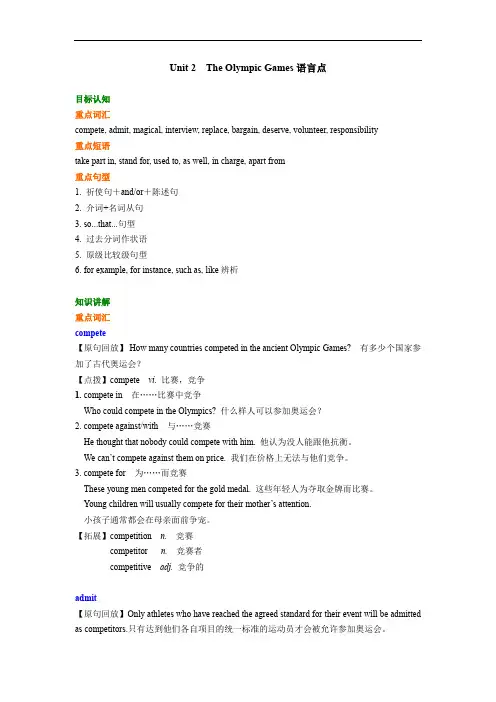
Unit 2 The Olympic Games语言点目标认知重点词汇compete, admit, magical, interview, replace, bargain, deserve, volunteer, responsibility重点短语take part in, stand for, used to, as well, in charge, apart from重点句型1. 祈使句+and/or+陈述句2. 介词+名词从句3. so...that...句型4. 过去分词作状语5. 原级比较级句型6. for example, for instance, such as, like辨析知识讲解重点词汇compete【原句回放】How many countries competed in the ancient Olympic Games? 有多少个国家参加了古代奥运会?【点拨】compete vi. 比赛,竞争1. compete in 在……比赛中竞争Who could compete in the Olympics? 什么样人可以参加奥运会?pete against/with 与……竞赛He thought that nobody could compete with him. 他认为没人能跟他抗衡。
We can’t compete against them on price.我们在价格上无法与他们竞争。
pete for 为……而竞赛These young men competed for the gold medal. 这些年轻人为夺取金牌而比赛。
Young children will usually compete for their mother’s attention.小孩子通常都会在母亲面前争宠。
【拓展】competition n. 竞赛competitor n. 竞赛者competitive adj. 竞争的admit【原句回放】Only athletes who have reached the agreed standard for their event will be admitted as competitors.只有达到他们各自项目的统一标准的运动员才会被允许参加奥运会。
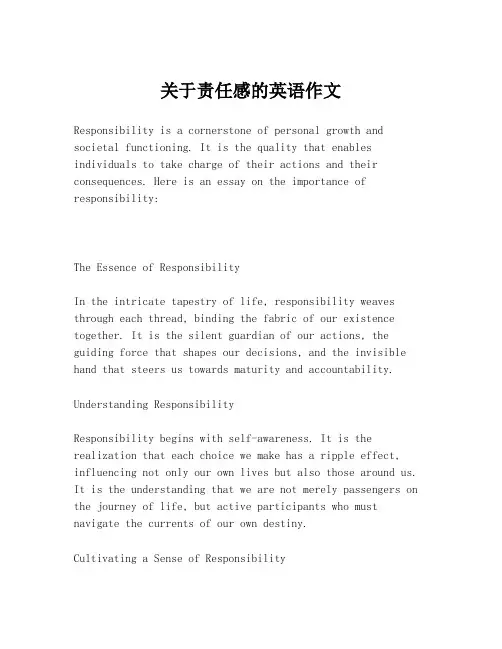
关于责任感的英语作文Responsibility is a cornerstone of personal growth and societal functioning. It is the quality that enables individuals to take charge of their actions and their consequences. Here is an essay on the importance of responsibility:The Essence of ResponsibilityIn the intricate tapestry of life, responsibility weaves through each thread, binding the fabric of our existence together. It is the silent guardian of our actions, the guiding force that shapes our decisions, and the invisible hand that steers us towards maturity and accountability.Understanding ResponsibilityResponsibility begins with self-awareness. It is the realization that each choice we make has a ripple effect, influencing not only our own lives but also those around us. It is the understanding that we are not merely passengers on the journey of life, but active participants who must navigate the currents of our own destiny.Cultivating a Sense of ResponsibilityTo cultivate a sense of responsibility, one must first embrace the concept of ownership. This means acknowledging that we are the authors of our own story and that the pen is in our hands. It involves taking pride in our work, being reliable to our commitments, and showing empathy towards others.Responsibility in ActionResponsibility is not a passive quality; it is an active force that demands action. It is demonstrated through punctuality, honesty, and integrity. It is evident when we hold ourselves to the same standards we hold others, when we admit our mistakes, and when we strive to make amends.The Impact of ResponsibilityThe impact of taking responsibility is profound. It fosters trust, respect, and credibility. It builds strong relationships, both personally and professionally. Moreover, it instills a sense of self-worth and self-confidence, as we recognize our ability to effect change and make a difference.Overcoming the Challenges of ResponsibilityWhile embracing responsibility can be challenging, especially in a world that often rewards instant gratification andshort-term gains, the rewards are immeasurable. It requires discipline, patience, and the courage to face the unknown. However, the sense of fulfillment and the knowledge that we are contributing positively to the world around us make thejourney worthwhile.ConclusionIn conclusion, responsibility is the compass that guides us through the complexities of life. It is the anchor that keeps us grounded and the wings that allow us to soar. By embracing responsibility, we not only enrich our own lives but also contribute to the collective good of society. It is alifelong commitment that shapes our character and defines our legacy. Let us, therefore, strive to be responsible individuals, for in doing so, we shape not only our own destiny but also the destiny of those around us.This essay aims to highlight the significance ofresponsibility and its role in personal development andsocial cohesion. It encourages readers to reflect on their actions and the impact they have on their environment, urging them to act responsibly and thoughtfully.。
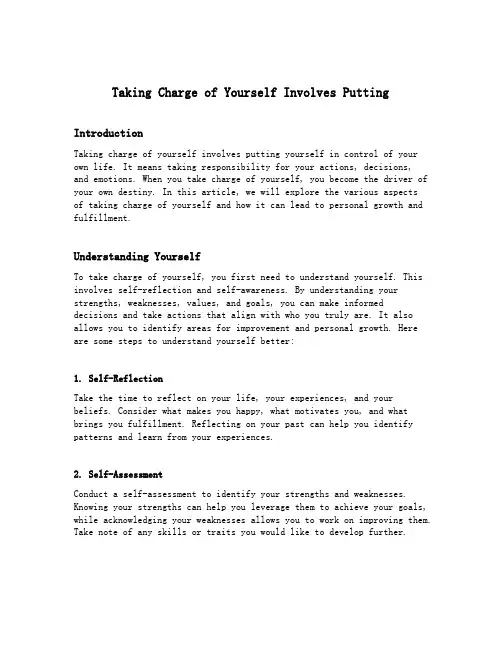
Taking Charge of Yourself Involves PuttingIntroductionTaking charge of yourself involves putting yourself in control of your own life. It means taking responsibility for your actions, decisions,and emotions. When you take charge of yourself, you become the driver of your own destiny. In this article, we will explore the various aspectsof taking charge of yourself and how it can lead to personal growth and fulfillment.Understanding YourselfTo take charge of yourself, you first need to understand yourself. This involves self-reflection and self-awareness. By understanding your strengths, weaknesses, values, and goals, you can make informeddecisions and take actions that align with who you truly are. It also allows you to identify areas for improvement and personal growth. Here are some steps to understand yourself better:1. Self-ReflectionTake the time to reflect on your life, your experiences, and your beliefs. Consider what makes you happy, what motivates you, and what brings you fulfillment. Reflecting on your past can help you identify patterns and learn from your experiences.2. Self-AssessmentConduct a self-assessment to identify your strengths and weaknesses. Knowing your strengths can help you leverage them to achieve your goals, while acknowledging your weaknesses allows you to work on improving them. Take note of any skills or traits you would like to develop further.3. Values and BeliefsIdentify your core values and beliefs. These are the principles that guide your decisions and actions. When your actions align with your values, you will feel a sense of integrity and authenticity. Understanding your values will help you make choices that are in line with your true self.4. Setting GoalsSet clear and achievable goals for yourself. Goals provide you with a sense of direction and purpose. When you have specific goals in mind, you can take steps towards achieving them and measure your progress along the way. Break down your goals into smaller, manageable tasks to make them more attainable.Taking ResponsibilityTaking charge of yourself also involves taking responsibility for your actions, decisions, and emotions. It means understanding that you have control over your own life and that you are responsible for the outcomes you create. Here are some ways to take responsibility:1. Own Your MistakesAcknowledge and own up to your mistakes. We all make errors, but taking responsibility for them is a sign of maturity. Learn from your mistakes and make amends if necessary. Taking ownership of your actions shows integrity and helps you grow as an individual.2. Embrace AccountabilityHold yourself accountable for your decisions and actions. Don’t blame others or external circumstances for your failures or shortcomings. Take the initiative to rectify any mistakes or setbacks you encounter. When you embrace accountability, you empower yourself to make positive changes.3. Manage Your EmotionsTake charge of your emotions and reactions. Emotional intelligence plays a crucial role in taking responsibility for your own well-being. Learn to recognize and manage your emotions effectively, as this will enable you to respond to situations in a more constructive manner.4. Learn from FeedbackBe open to feedback and criticism. Constructive feedback can provide valuable insights into areas where you can improve. Instead of becoming defensive, view feedback as an opportunity for growth. Reflect on the feedback you receive and use it to enhance your skills and performance.Empowering YourselfTaking charge of yourself also involves empowering yourself to live a meaningful and fulfilling life. Empowerment is about discovering your true potential and actively working towards achieving your goals. Here are some ways to empower yourself:1. Continuous LearningCommit yourself to lifelong learning. Stay curious and open-minded. Seek out new knowledge and experiences that align with your interests and passions. By continuously learning, you expand your horizons and empower yourself with valuable skills and knowledge.2. Develop ResilienceCultivate resilience in the face of challenges and setbacks. Resilience allows you to bounce back from adversity and continue moving forward. Develop coping strategies and practice self-care to strengthen your resilience. Remember that setbacks and failures are opportunities for growth.3. Build a Support NetworkSurround yourself with positive and supportive people. Build a strong support network of family, friends, and mentors who can provide guidance, encouragement, and inspiration. Having a supportive community can empower you to overcome obstacles and achieve your goals.4. Practice Self-CareTake care of your physical, mental, and emotional well-being. Prioritize self-care activities such as exercise, healthy eating, getting enough rest, and engaging in activities that bring you joy and relaxation. When you prioritize self-care, you have more energy and resilience to take charge of your life.ConclusionTaking charge of yourself involves putting yourself in the driver’sseat of your own life. It requires understanding yourself, taking responsibility for your actions, and empowering yourself to live a fulfilling life. By taking charge of yourself, you can create the life you desire, achieve personal growth, and find happiness and fulfillment along the way. Remember, it is never too late to start taking charge of yourself and shaping your own destiny.。
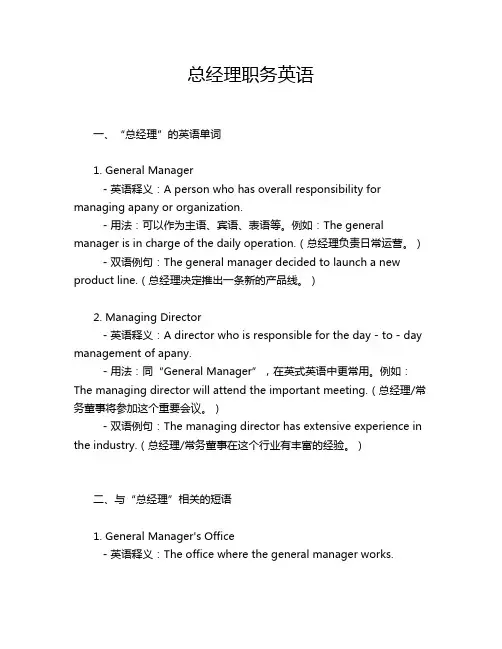
总经理职务英语一、“总经理”的英语单词1. General Manager- 英语释义:A person who has overall responsibility for managing apany or organization.- 用法:可以作为主语、宾语、表语等。
例如:The general manager is in charge of the daily operation.(总经理负责日常运营。
) - 双语例句:The general manager decided to launch a new product line.(总经理决定推出一条新的产品线。
)2. Managing Director- 英语释义:A director who is responsible for the day - to - day management of apany.- 用法:同“General Manager”,在英式英语中更常用。
例如:The managing director will attend the important meeting.(总经理/常务董事将参加这个重要会议。
)- 双语例句:The managing director has extensive experience in the industry.(总经理/常务董事在这个行业有丰富的经验。
)二、与“总经理”相关的短语1. General Manager's Office- 英语释义:The office where the general manager works.- 用法:作为地点名词短语。
例如:You can find him in the general manager's office.(你可以在总经理办公室找到他。
) - 双语例句:The general manager's office is on the fifth floor.(总经理办公室在五楼。
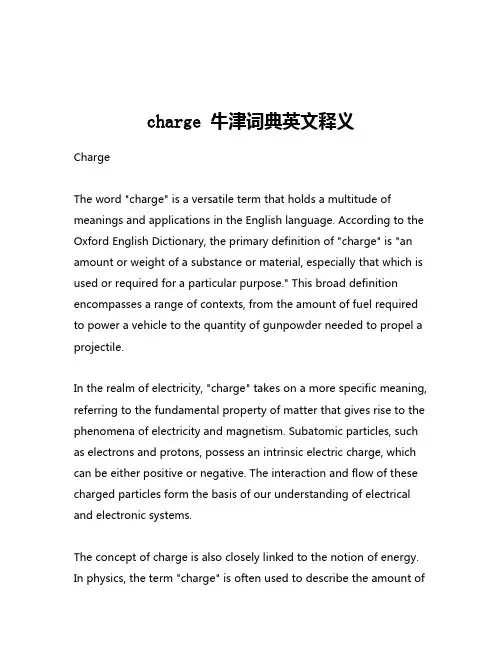
charge 牛津词典英文释义ChargeThe word "charge" is a versatile term that holds a multitude of meanings and applications in the English language. According to the Oxford English Dictionary, the primary definition of "charge" is "an amount or weight of a substance or material, especially that which is used or required for a particular purpose." This broad definition encompasses a range of contexts, from the amount of fuel required to power a vehicle to the quantity of gunpowder needed to propel a projectile.In the realm of electricity, "charge" takes on a more specific meaning, referring to the fundamental property of matter that gives rise to the phenomena of electricity and magnetism. Subatomic particles, such as electrons and protons, possess an intrinsic electric charge, which can be either positive or negative. The interaction and flow of these charged particles form the basis of our understanding of electrical and electronic systems.The concept of charge is also closely linked to the notion of energy. In physics, the term "charge" is often used to describe the amount ofenergy stored or transferred in a given system. For example, a battery stores a certain amount of electrical charge, which can be released to power various devices. Similarly, the charge of a capacitor, a device that stores electrical energy, determines the amount of energy it can deliver.Beyond the realm of physics and electricity, the term "charge" has a wide range of applications in everyday life. In the context of finance, a "charge" can refer to a fee or cost associated with a particular service or transaction. For instance, a bank may impose a "charge" for the use of an ATM or for the processing of a credit card payment.In the military and law enforcement domains, the term "charge" is used to describe a formal accusation or allegation of a crime or offense. When an individual is "charged" with a crime, they are formally accused of committing a specific unlawful act and may face legal consequences.The concept of "charge" also extends to the realm of personal responsibility and duty. In this context, a "charge" can refer to the care, custody, or supervision of a person or object. For example, a parent may be said to have "charge" of their child, while a caretaker may be entrusted with the "charge" of a vulnerable individual or a valuable asset.Furthermore, the term "charge" can be used to describe the act of taking on or accepting a responsibility or task. When someone "takes charge" of a situation, they are assuming a leadership role and taking control of the proceedings. Similarly, a person may be "charged" with a specific duty or assignment, indicating that they have been entrusted with the responsibility to carry it out.In the world of sports and competition, the term "charge" is often used to describe a forceful, aggressive movement or action. A player may "charge" towards the goal, or a team may "charge" into battle, demonstrating their determination and competitive spirit.The versatility of the term "charge" is further exemplified in the realm of language and communication. In rhetoric and public speaking, a "charge" can refer to a passionate or forceful appeal or exhortation, designed to inspire or motivate the audience. A speaker may "charge" the audience with a call to action or a rousing message.In conclusion, the word "charge" is a multifaceted term that encompasses a wide range of meanings and applications across various domains. From the fundamental properties of matter to the complexities of human behavior and interaction, the concept of "charge" continues to play a significant role in our understanding and navigation of the world around us.。
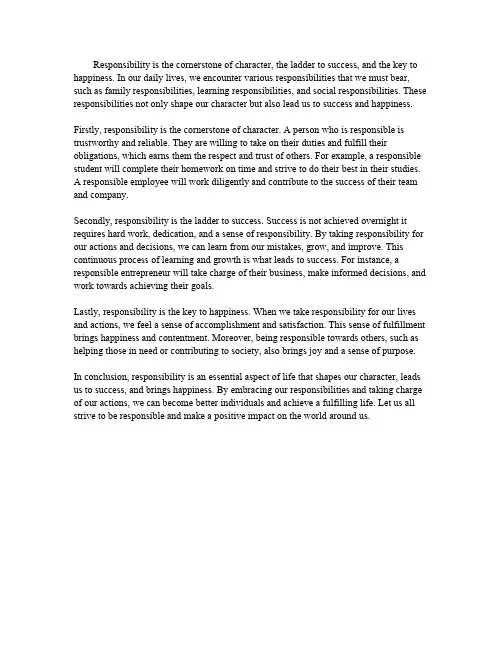
Responsibility is the cornerstone of character,the ladder to success,and the key to happiness.In our daily lives,we encounter various responsibilities that we must bear, such as family responsibilities,learning responsibilities,and social responsibilities.These responsibilities not only shape our character but also lead us to success and happiness.Firstly,responsibility is the cornerstone of character.A person who is responsible is trustworthy and reliable.They are willing to take on their duties and fulfill their obligations,which earns them the respect and trust of others.For example,a responsible student will complete their homework on time and strive to do their best in their studies.A responsible employee will work diligently and contribute to the success of their team and company.Secondly,responsibility is the ladder to success.Success is not achieved overnight it requires hard work,dedication,and a sense of responsibility.By taking responsibility for our actions and decisions,we can learn from our mistakes,grow,and improve.This continuous process of learning and growth is what leads to success.For instance,a responsible entrepreneur will take charge of their business,make informed decisions,and work towards achieving their goals.Lastly,responsibility is the key to happiness.When we take responsibility for our lives and actions,we feel a sense of accomplishment and satisfaction.This sense of fulfillment brings happiness and contentment.Moreover,being responsible towards others,such as helping those in need or contributing to society,also brings joy and a sense of purpose. In conclusion,responsibility is an essential aspect of life that shapes our character,leads us to success,and brings happiness.By embracing our responsibilities and taking charge of our actions,we can become better individuals and achieve a fulfilling life.Let us all strive to be responsible and make a positive impact on the world around us.。
In todays fastpaced society,the concept of responsibility has become increasingly important.Whether in personal life,professional settings,or within the community,a strong sense of responsibility is essential for the smooth functioning of society and the wellbeing of individuals.Understanding the Importance of ResponsibilityResponsibility is the ability to recognize and accept the obligations that one owes to oneself,to others,and to society.It is the willingness to take charge of ones actions and their consequences.A person with a strong sense of responsibility is reliable,trustworthy, and accountable for their decisions and actions.Cultivating a Sense of Responsibility1.SelfAwareness:The first step in developing a sense of responsibility is selfawareness. Understanding ones strengths and weaknesses can help in setting realistic goals and expectations.mitment to Actions:Once a decision is made,it is important to follow through with it.This means not only starting a task but also seeing it through to completion.3.Accountability:Holding oneself accountable for ones actions is crucial.This involves acknowledging mistakes and learning from them,rather than shifting blame onto others.4.Ethical Behavior:Upholding ethical standards in all aspects of life is a sign of a responsible individual.This includes honesty,integrity,and respect for others.5.Continuous Learning:A responsible person is always open to learning and improving. This includes seeking feedback and being willing to adapt to new information and situations.The Impact of Responsibility on SocietyA society where individuals take responsibility for their actions is more harmonious and productive.It fosters trust,cooperation,and a sense of community.When people are responsible,they contribute positively to the social fabric,leading to a more stable and prosperous environment.Overcoming Challenges to ResponsibilitySometimes,external factors such as peer pressure,societal norms,or personal insecurities can challenge ones sense of responsibility.Overcoming these challenges requires resilience,courage,and a strong moral compass.ConclusionIn conclusion,a strong sense of responsibility is a cornerstone of personal integrity and social stability.It is not just about fulfilling obligations but also about contributing to a better world.By cultivating a sense of responsibility,we can ensure that our actions are guided by a commitment to excellence,fairness,and respect for all.。
1. It is my responsibility to... (这是我的责任...)It is my responsibility to make sure the project is pleted on time. (确保工程按时完成是我的责任。
)2. I am accountable for... (我应对...负责)I am accountable for any errors in the report. (我应对报告中的任何错误负责。
)3. I am in charge of... (我负责...)I am in charge of managing the department's budget. (我负责管理部门的预算。
)4. I am obligated to... (我有责任...)I am obligated to inform my supervisor of any issues. (我有责任告知我的主管任何问题。
)5. I take full responsibility for... (我对...负完全责任)I take full responsibility for the delay in the project. (我对工程延迟负完全责任。
)6. It falls on me to... (这落在我身上...)It falls on me to ensure that everyone is trained properly. (这落在我身上,要确保每个人都受到适当的培训。
)7. I bear the responsibility for... (我承当...的责任)I bear the responsibility for the safety of the employees. (我承当员工平安的责任。
)8. It is up to me to... (这取决于我...)It is up to me to make sure the project is within budget. (这取决于我确保工程在预算范围内。
着落的英语单词单词:着落1. 定义与释义1.1词性:名词、动词1.2释义:①名词,事情有归宿、有结果;②动词,可以依靠或指望的来源。
1.3英文释义:①Noun: A situation where things have a final settlement or result. ②Verb: A reliable source that can be depended on or counted on.1.4相关词汇:同义词有下落、归属;派生词有有着落(be settled)。
---2. 起源与背景2.1词源:该词源于古代汉语的使用,经过长期的语言发展保留至今。
2.2趣闻:在古代寻找失物或者解决事情的时候,人们就常说要找到一个“着落”,比如寻找丢失的牲畜,只有找到它的着落(所在之处或者归属之处)才能安心。
---3. 常用搭配与短语3.1短语:(1)有了着落:表示事情有了结果或者安排。
例句:工作的事情终于有了着落,他心里的大石头落了地。
翻译:The job has finally been settled, and he feels a great relief.(2)寻找着落:表达正在找寻依靠或者结果。
例句:那个走失的孩子正在寻找着落。
翻译:The lost child is looking for a place to rely on.---4. 实用片段(1)“小王,你之前说要创业的资金有着落了吗?”老张关切地问。
“还没有呢,我正在到处找投资。
”小王无奈地回答。
翻译:"Xiao Wang, have you got the funds for starting your business?" Lao Zhang asked with concern. "Not yet. I'm looking for investment everywhere." Xiao Wang replied helplessly.(2)“这一批货物的存放着落在哪里?我们得赶紧确定。
2015 11 14雅思范文一、题目(假设)Some people think that the government should be responsible for protecting the environment. Others believe that individuals should take the responsibility. Discuss both views and give your own opinion.二、范文。
Well, let's talk about this whole environment protection responsibility thing.On one hand, there are those who think the government should be in charge. And you know what? They've got some good points. The government has a whole lot of power and resources at its fingertips. It can make big time laws and regulations. For example, they can set strict limits on factory emissions. Imagine a world where the government just says, "Hey, factories! You can't pump out that stinky, polluting smoke anymore unless you clean it up first." And they can also invest a ton of money in public transportation to make it more accessible and environmentally friendly. It's like building subways and light rails all over the place so that people don't have todrive their cars everywhere, which would cut down on a lot of exhaust fumes.On the other hand, the idea that individuals should be responsible for protecting the environment also holds water. After all, it's us humans who are doing a lot of the polluting in our daily lives. I mean, think about it. Every time we leave the lights on when we don't need to, or when we throw away a plastic bottle instead of recycling it, we're adding to the environmental problems. We can start small, like bringing our own reusable bags to the grocery store. It's not that hard, right? And if everyone did just a few simple things like this, it could add up to a huge difference.In my opinion, both the government and individuals need to step up.It's like a team effort. The government should lead the way with those big policies and investments, but without the cooperation of individuals, it's all for nothing. We need to follow the rules the government sets and also be more conscious of our own actions. It's like a dance the government is leading, but we individuals have to keep up with the steps. So, let's all do our part, whether we're the big, powerful government or just little old us going about our daily lives.。
12月必背高频词List 11.the start of adulthood2.be in charge of your own life3.the next general election4.earn a wage5.car accidents involving teenagers6.the legal age for doing...7.I’m already mature enough to do...8.take responsibility for my life9.I expected to feel instantly different10.as if I had closed the door on my childhood11.there were rules to obey12.feel more aware of other people13.sign an organ donation agreement14.I knew they would approve.15.the way that society views me16.a bank contacted me17.I currently don’t have a steady income18.a credit card might tempt meto spend more money19.I assume that I will...20.I contribute to the household bills21.I’m not ready to make that kind of commitment22.a magnificent picture23.swallow an animal24.they need six months for digestion25.I show my masterpiece to the grown-ups26.the grown-ups response was to ...y aside my drawing28.devote myself to geography29.it is tiresome to be always explaining...30.I choose another profession.31.learn to pilot airplanes32.at a glance33.distinguish China from Arizona34.such knowledge is valuable35.have a great many encounter with some people36.matters of consequence37.I have seen them intimately38.he is clear-sighted39.a fundraising campaign40.new sports equipment41.post photos42.switch on their devices43.be motivated to last the full seven days44.the detox was more difficult to tolerate45.on reflection46.my time was occupied with checking my phone47.be occupied with doing sth48.pick up my hobbies49.I managed the whole week!50.be distracted by message on the phoneList 251.miss out (the opportunity)52.constantly check my phone53.make full use of my spare time54.to see what everyone else was up to55.to be honest56.leave me tired out57.without access to social media58.my social media accounts59.catch up on news60.the posts on the forum61.Something other than money has been raised.62.if anything63.my parents worked out this trick64.work out a proposal65.work out the complicated plot66.things have worked out well67.wear appropriate clothes68.be considerate of others69.promote values education70.clarify what he means71.vary from person to person72.handle their money73.recent headlines74.in contrast to75.is no barrier to success76.people in her district77.inside the bad are necessities78.crowd funding79.On receiving sth,80.intend to do81.personal finances82.be responsible for your ownhappiness83.a vision for the future84.likewise85.put aside money for your university education86.invest in yourself87.an animal charity88.whatever cause you believe in89.think objectively about...90.be better equipped to do91.make informed choices92.manage the money93.a new chapter94.a legendary store95.drop in/drop by96.be packed into boxes97.read e-books on tablets98.the store’s elderly owner99.online discounts100.some words of sympathy List 3101. a dusty shelfments on the books 103.be hidden in a thick mist 104.disappear for good105. a booking reading was being delivered106.be replaced by a big screen 107.customers’comments were being displayed108.take over the bookstore munity eventsanic food111.readers’comments keep popping up112.be combined with creativity 113.my humble bookstore 114.emphsise the importance of...115.be in favor of the plan 116.do me a favor117.The condition is in his favor.118.reform and opening-up 119.pave the way for., age and occupation 121.waiting outside the cafeteria122.I’m running late.123.reply with a smile124.search for emojis on my phone125.my first attempt126.follow the trend127.the rapid development128.an essential component 129.literally mean sth130.small symbols representing ideas131.different categories132.be limited to 100 simple designs133.expand our horizons 134.have advantages over written languagee gestures when we speaka message or post136.facial expressionexpress sadness over your separation137.spread to扩展到,138. a Shakespeare series 139.the intention of these adaptations140.be accessible to young readers141.these new versions142.have a tendency to do 143.send a message packed with emojis144.convincing evidence 145.they claim that...146.massive dragons147.particularly vivid148.protect the delicate system 149.delicate design150.the first landmark to catch my eyeList 4151.the splendid Qingshuihe Bridge152.at their leisure153.their natural habitat154.seem unaware that... 155.the distinct ecosystem156.be located at...157.enjoy regular breaks 158. a sense of achievement 159.construction waste160.cattle and sheep wander the grasslands161.bring the scenery to life 162.thanks to our efforts 163.these magical landscapes 164.deserve the care165.be concerned about166.as far as I am concerned 167.do not disturb168.in harmony withe up natural resources 170.the working hours are flexible171.accommodation is provided 172.promote the islands173.highlight the importance of 174.be located off the coast 175.be made up of176.it is host to many species of birds177.sea creature178.is under threat179.candidates180.in addition to181.eye-catching marketing events182.exist in the balance183.remain a safe habitat 184. a dream destination185.All applicants are welcome. 186.preference will be given to those who...187.driving qualification 188.be qualified for../to do... 189.the captain of the ship 190.distant countries191.scientific discoveries 192.be fascinated by/with...193.The ship was crowded with samples of plants.e to exist195.animals evolve196.adapt to their changing environments197.inspire sb to do198. a variety of new species 199.food was available200.Darwin suspected that......。
管理英语短语charge1. Take charge: to take control or responsibility of a situation, project or team.Example: Mary is taking charge of the new marketing campaign.2. In charge: responsible for overseeing or managing a situation, project, or team.Example: John is in charge of the accounting department.3. Charge ahead: to proceed with determination or enthusiasm.Example: I need to charge up my phone before I leave.5. Charge someone with: to formally accuse someone of a crime or wrongdoing.Example: The police charged him with robbery.6. Charge it to: to put an expense onto someone's account or credit card.Example: The customer initiated a chargeback for the faulty product.8. Charge account: an account with a supplier or vendor which allows for purchases to be charged and billed at a future date.9. Charge sheet: a formal document that lists the charges against a person who is being accused of a crime.Example: The judge read out the charge sheet during the court hearing.10. Charge nurse: a registered nurse who is responsible for overseeing and managing a team of nurses.Example: The charge nurse is responsible for assigning patient care duties to the nurses.。
The Charge of the Light Brigade
Alfred, Lord Tennyson
Tennyson based this famous poem on the Battle of Balaklava, fought on October 25, 1854, during the Crimean War, in which a small force of British cavalry made a daring but disastrous assault against a Russian artillery line. After the attack, only 195 of the 673 men in the Light Brigade answered muster call. There are times, such as in this tragic story, when obedient acts of self-sacrifice and courage merit both admiration and profound gratitude.
Half a league, half a league,
Half a league onward,
All in the valley of Death
Rode the six hundred.
"Forward, the Light Brigade!
Charge for the guns!" he said:
Into the valley of Death
Rode the six hundred.
"Forward, the Light Brigade!"
Was there a man dismay'd?
Not tho' the soldier knew
Someone had blunder'd:
Theirs not to make reply,
Theirs not to reason why,
Theirs but to do and die:
Into the valley of Death
Rode the six hundred.
Cannon to right of them,
Cannon to left of them,
Cannon in front of them
Volley'd and thunder'd,
Storm'd at with shot and shell,
Boldly they rode and well,
Into the jaws of Death,
Into the mouth of Hell
Rode the six hundred.
1.
Flash'd all their sabers bare,
Flash'd as they turn'd in air
Sab'ring the gunners there,
Charging an army, while
All the world wonder'd:
Plunged in the battery smoke
Right thro' the line they broke;
Cossack and Russian
Reel'd from the saber stroke
Shatter'd and sunder'd.
Then they rode back, but not
Not the six hundred.
Cannon to right of them,
Cannon to left of them,
Cannon behind them
Volley'd and thunder'd:
Storm'd at with shot and shell,
While horse and hero fell,
They that had fought so well
Came through the jaws of death
Back from the mouth of hell,
All that was left of them-
Left of six hundred.
When can their glory fade?
Oh, the wild charge they made!
All the world wonder'd.
Honor the charge they made!
Honor the Light Brigade-
Noble six hundred!
2.。